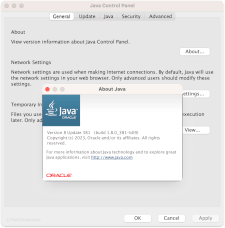JRE
Stands for "Java Runtime Environment."
JRE is a software layer that allows a computer's operating system to run Java applications and applets. It includes several components that Java apps require before they can function, including a virtual machine and code resource libraries. A Java Runtime Environment is available for most computer platforms, including Windows, macOS, and Unix.
Java is a popular programming language for creating cross-platform applications, but most operating systems do not include native Java support. Instead, users must install the Java Runtime Environment before Java apps can run on their system. The JRE packages together several necessary components. First, it includes a standard set of Java class libraries that contain common code snippets that Java applications can use. It also includes a Java Virtual Machine (JVM), which executes the bytecode within compiled Java applications while working with the operating system to provide Java apps access to memory and other system resources.
The JRE is available for download from Oracle, the current owner of the Java platform, for Windows, macOS, and Unix. It was formerly available as a web browser plug-in that allowed users to run Java applets in the browser, but the plug-in was discontinued in 2016. The JRE is also available as part of the Java Development Kit (JDK) along with a debugger, compiler, and other tools that help developers create Java apps.
 Test Your Knowledge
Test Your Knowledge